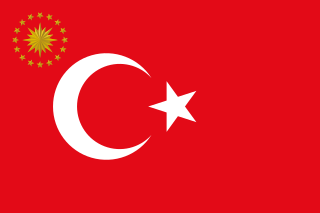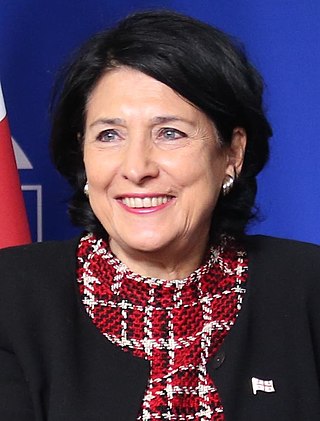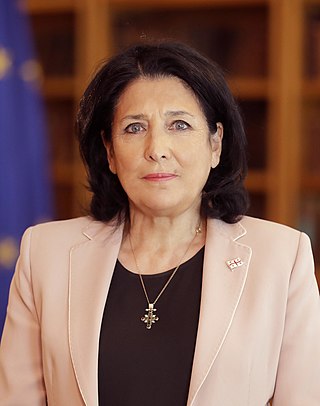| |||
| |||
Presidential elections are scheduled to be held in Georgia in 2024. They will be the eighth presidential elections in Georgian history. The previous presidential elections in 2018 resulted in the election of Salome Zurabishvili.
| |||
| |||
Presidential elections are scheduled to be held in Georgia in 2024. They will be the eighth presidential elections in Georgian history. The previous presidential elections in 2018 resulted in the election of Salome Zurabishvili.
The President of Georgia is the ceremonial head of state of Georgia as well as the commander-in-chief of the Defense Forces. In 2013, a series of constitutional amendments passed in the Parliament of Georgia from 2010 to 2013 entered into force, finalizing Georgia's transition to a parliamentary republic. The president's executive powers were significantly curtailed in favor of the Prime Minister. [1]
In 2017 the Parliament of Georgia adopted several constitutional amendments with 117 voting in favor and two against. The amendments abolished direct presidential elections starting from 2024. [2] [3] President Giorgi Margvelashvili vetoed the constitutional amendment on 9 October, describing it as an "anti-people constitution". Parliament overrode his veto on 13 October. [4] The constitutional amendments went into effect after the 2018 presidential elections and the inauguration of President Salome Zurabishvili on 16 December 2018.
For the 2024 elections, the president will be elected by a 300-member Electoral College, the composition of which will be approved by the Central Election Commission. It will include all members of Parliament, the legislative bodies of the Autonomous Republics of Abkhazia and Adjara, and nominees of the respective political parties from among the representative bodies of local government. [5]
The President of Georgia will be elected for a term of five years, without debates and by open ballot. The same person can be elected President of Georgia only twice. Any citizen of Georgia who has voting rights, is aged 40 or over and who has lived in Georgia for at least fifteen years, is eligible to run for the presidency. A candidate requires the backing of at least 30 members of the Electoral College to be nominated.

The politics of Armenia take place in the framework of the parliamentary representative democratic republic of Armenia, whereby the president of Armenia is the head of state and the prime minister of Armenia the head of government, and of a multi-party system. Executive power is exercised by the president and the Government. Legislative power is vested in both the Government and Parliament.
Politics in Georgia involve a parliamentary representative democratic republic with a multi-party system. The President of Georgia is the ceremonial head of state and the Prime Minister of Georgia is the head of government. The Prime Minister and the Government wield executive power. Legislative power is vested in both the Government and the unicameral Parliament of Georgia.

A veto is a legal power to unilaterally stop an official action. In the most typical case, a president or monarch vetoes a bill to stop it from becoming law. In many countries, veto powers are established in the country's constitution. Veto powers are also found at other levels of government, such as in state, provincial or local government, and in international bodies.

The president of Turkey, officially the president of the Republic of Türkiye, is the head of state and head of government of Turkey. The president directs the executive branch of the national government and is the commander-in-chief of the Turkish military. The president also heads the National Security Council.

The president of Georgia is the ceremonial head of state of Georgia as well as the commander-in-chief of the Defense Forces. The constitution defines the presidential office as "the guarantor of the country's unity and national independence."
A supermajority is a requirement for a proposal to gain a specified level of support which is greater than the threshold of more than one-half used for a simple majority. Supermajority rules in a democracy can help to prevent a majority from eroding fundamental rights of a minority, but they can also hamper efforts to respond to problems and encourage corrupt compromises at times when action is taken. Changes to constitutions, especially those with entrenched clauses, commonly require supermajority support in a legislature. Parliamentary procedure requires that any action of a deliberative assembly that may alter the rights of a minority have a supermajority requirement, such as a two-thirds vote. In consensus democracy the supermajority rule is applied in most cases.

The Parliament of Georgia is the supreme national legislature of Georgia. It is a unicameral parliament, currently consisting of 150 members; of these, 120 are proportional representatives and 30 are elected through single-member district plurality system, representing their constituencies. According to the 2017 constitutional amendments, the Parliament will transfer to fully proportional representation in 2024.

A parliamentary republic is a republic that operates under a parliamentary system of government where the executive branch derives its legitimacy from and is accountable to the legislature. There are a number of variations of parliamentary republics. Most have a clear differentiation between the head of government and the head of state, with the head of government holding real power and the head of state being a ceremonial position, similar to constitutional monarchies. In some countries the head of state has reserve powers to use at their discretion as a non-partisan "referee" of the political process. Some have combined the roles of head of state and head of government, much like presidential systems, but with a dependency upon parliamentary confidence.

The Government of Georgia is the supreme body of executive power in Georgia that implements the domestic and foreign policies of the country. It consists of the prime minister—the head of the government—and ministers and is accountable and responsible to the Parliament of Georgia. The current powers and responsibilities of the government are governed by the amendments of the Constitution of Georgia passed in 2017 and 2018. From 14 May 1991 to 9 November 1996, the executive government of Georgia was referred to as the Cabinet of Ministers of the Republic of Georgia.

Salome Zourabichvili is a French-Georgian politician and former diplomat currently serving as the fifth president of Georgia, in office since December 2018. She is the first woman to be elected as Georgia's president, a position she will occupy for a term of six years. As a result of constitutional changes coming into effect in 2024, Zourabichvili is expected to be Georgia's last popularly elected president; future heads of state are to be elected indirectly by a parliamentary college of electors.

The Constitution of Georgia is the supreme law of Georgia. It was approved by the Parliament of Georgia on 24 August 1995 and entered into force on 17 October 1995. The Constitution replaced the Decree on State Power of November 1992 which had functioned as an interim basic law following the dissolution of the Soviet Union.

Parliamentary elections were held in Georgia on 1 October 2012. The opposition Georgian Dream coalition of billionaire businessman Bidzina Ivanishvili won a majority of the seats. President Mikheil Saakashvili conceded his party's defeat.

Presidential elections were held in Georgia on 27 October 2013, the sixth presidential elections since the country's restoration of independence from the Soviet Union in 1991. The last elections in January 2008 resulted in the re-election of Mikheil Saakashvili for his second and final presidential term. Saakashvili was constitutionally barred from running for a third consecutive term.

Giorgi Margvelashvili is a Georgian academic and politician who was the fourth president of Georgia, in office from 17 November 2013 to 16 December 2018.
The following lists events in 2017 in Georgia.

Presidential elections were held in Georgia on 28 October 2018. As no candidate received more than 50% of the vote in the first round, a runoff between Salome Zourabichvili and Grigol Vashadze was held on 28 November 2018. Salome Zourabichvili won with around 60% of the vote in the second round and took office on 16 December 2018.
The following lists events in 2018 in Georgia.

Salomé Zourabichvili's tenure as the fifth president of Georgia began with her inauguration on 16 December 2018, and the first presidency since the adoption of a new Constitution transforming Georgia into a parliamentary system in 2018. Zourabichvili's term is set to be the longest term of any presidency in Georgia's history, as the transition into a new Constitution means that her mandate will last until 2024.

The 2019 protests in Georgia, also known as Gavrilov's Night, refers to a series of anti-government and snap election-demanding protests in the country of Georgia.

Parliamentary elections are scheduled to be held in Georgia on 26 October 2024.